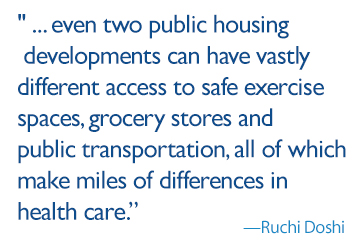In some ways, a hospital is a great equalizer. Once you’re admitted, things like employment status or race no longer matter — unless that happens to be medically relevant. What matters is that you’re sick enough to need a team of health professionals to take care of you. Whether you live in a gated community or public housing, once you shed your clothes and slip on the hospital gown, you’re all the same, entitled to equal respect and medical care. As a medical student seeing inpatients, it is sometimes easy to forget that these patients, while they may appear equal within the walls of the wards, have extremely diverse social experiences once they leave the hospital.
When I was first asked if I was interested in helping out with a pilot study delivering interventions to reduce sugary beverage consumption in Baltimore, I was intrigued. After my third year of medical school, traditionally a clinical year in the hospital, followed by a year of studying obesity, nutrition and the social determinants of health during my master’s degree in public health, I was excited to go into the field to research a topic about which I was passionate. I wanted to see where my patients lived, gain firsthand knowledge of their experiences, and ultimately understand how these factors personally impact a population I have come to know and care for.
What I didn’t anticipate was the complete culture shock. After several years of living and studying in Baltimore, I was convinced that I knew the nitty-gritty of this ever-evolving city well and that little could surprise me. However, entering a public housing development and recognizing that this was where several of my past patients lived came as a shock. The great equalizer of the hospital gown was instantaneously dropped, and what remained was a stark awareness that upon discharge, my patients were going home to very, very different neighborhoods.
Suddenly, I felt foolish. My advice to patients with heart failure who lived in this area — encouraging them to limit their sodium intake — seemed ridiculous, given that most of them didn’t have access to a car and the corner store nearby stocked few healthy foods or fresh produce. Was I recommending that they effectively starve in order to comply with a low-sodium diet? Why hadn’t I done more research to figure out what foods were accessible to them? And, with some guilt, I remembered that time I recommended a patient cut back on sugary beverages, thinking to myself that it couldn’t be that difficult. If someone really dislikes the taste of the tap water available to them at home and soda costs less than the bottled water down the street, what did I expect them to choose? I wondered why I hadn’t recommended “zero-calorie” drinks instead — especially after hearing a few individuals in the study expressly state that they hated drinking their home’s tap water.
It is impossible for any health care professional to know all the differing social contexts of every single patient. Everyone has a unique home life, and even two public housing developments can have vastly different access to safe exercise spaces, grocery stores and public transportation, all of which make miles of differences in health care. What is within reach, however, is checking in with patients to see if our advice makes sense by asking them what they believe is achievable. You can be sure that in the future, when I give any medical recommendations, I won’t make that past mistake of forgetting the social foundations of health and will instead make it a point to explicitly ask what challenges my patients may face in following my advice.
Related Content
- New Mobile Clinic Serves East Baltimore Community
- Breaking Down Barriers: Medicine for the Greater Good takes internal medicine residents out of the clinic to educate, advocate and build trust.
- A recent study by Johns Hopkins researchers has found that the most important factor for weight loss may be the quality of the relationship between a physician and patient.
- Locally Combating the Childhood Obesity Epidemic

Excellent perspective - thanks for posting this!
Comments are closed.